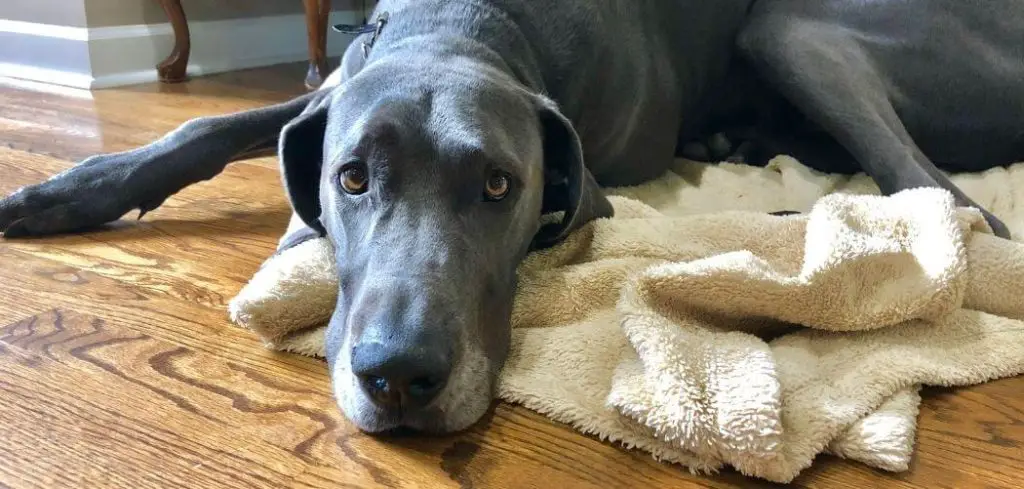When an older dog suddenly stops eating and begins throwing up, it’s a deeply concerning sign for any pet parent.
These symptoms together often point to underlying health issues that need attention sooner rather than later.
We outline the common causes of an old dog not eating and throwing up, what you can do at home, and when to seek veterinary help.
Table of Contents
Old Dog Not Eating and Throwing Up — Why It Happens
Loss of appetite and vomiting in senior dogs can stem from a variety of serious conditions including digestive issues, kidney or liver disease, pancreatitis, infections, and even cancer. Sometimes medications or stressors related to aging play a role, too. Because older dogs are less resilient than younger ones, these problems can escalate quickly and should not be ignored.

Old Dog Not Eating and Throwing Up: Common Causes
Gastrointestinal Upset
Older dogs often develop sensitive stomachs, and even a minor change in diet can trigger vomiting and loss of appetite. Spoiled food, dietary indiscretion, or sudden food changes can irritate the stomach lining.
Pet parents may notice their senior dog refusing meals, retching after eating, or passing loose stools alongside vomiting.
In senior dogs, what seems like a simple “stomach bug” can spiral into dehydration and weakness faster than expected.
Read more: Old dog shivering and not eating (What it could mean)
Kidney Disease
Kidney problems are extremely common in aging dogs and often manifest with nausea and vomiting.
When the kidneys can’t properly filter waste, toxins build up in the bloodstream and cause a dog to feel sick.
Owners may notice bad breath with a chemical odor, increased drinking and urination, weight loss, and complete disinterest in food.
Vomiting worsens the condition by further depleting fluids, making kidney disease a medical emergency when appetite loss and vomiting occur together.
Liver Disease
The liver plays a key role in digestion and detoxification. When it begins to fail, waste products accumulate, leading to nausea and vomiting.
Older dogs with liver problems may also show signs like yellowing of the eyes or gums, lethargy, and weight loss.
These dogs often turn away from their food and may vomit bile or partially digested food. Because the liver is essential for so many bodily functions, this combination of symptoms should always prompt a vet visit.
Pancreatitis
Pancreatitis, or inflammation of the pancreas, is another common issue in older dogs. It can be triggered by fatty foods, but in seniors it may also occur spontaneously.
Vomiting is often severe and repetitive, and appetite is quickly lost. Dogs with pancreatitis may hunch their backs in pain, act restless, or show abdominal tenderness. Without treatment, the inflammation can lead to dangerous complications.
Infections
Bacterial or viral infections can make an old dog feel too unwell to eat and cause vomiting. Common culprits include gastrointestinal infections or systemic illnesses that overwhelm the body.
Alongside vomiting and appetite loss, you may see fever, diarrhea, or sudden lethargy. In older dogs, whose immune systems are weaker, even a moderate infection can take a heavy toll.
Cancer
Unfortunately, cancer is one of the leading causes of vomiting and appetite loss in older dogs. Tumors in the stomach, intestines, or other organs can physically block digestion or cause nausea through toxin release.
Weight loss despite lack of appetite, persistent vomiting, or blood in the vomit are all red flags. While not every case of vomiting points to cancer, it’s important not to dismiss this possibility in an aging pet.
What to Do If Your Old Dog Is Not Eating and Is Throwing Up
If your old dog refuses food and is throwing up, it’s important to act with care. First, remove food for a few hours to let the stomach settle, but ensure fresh water is available at all times.
Try offering a bland diet such as boiled chicken and rice in small portions once vomiting slows. Encourage hydration with water or a pet-safe electrolyte solution, as dehydration is a major risk for senior dogs.
Monitor your dog closely for signs of worsening weakness, continued vomiting, or changes in stool. If your dog is on medication, check with your vet to see whether side effects could be playing a role.
While some mild stomach upset may resolve, never assume vomiting in an old dog is harmless. Because of their age, seniors can deteriorate rapidly without proper treatment.
When to Call or Visit Your Vet
Seek veterinary care immediately if your old dog continues vomiting for more than 12–24 hours, refuses all food and water, or shows signs of dehydration like sunken eyes or dry gums.
Blood in the vomit, black tarry stools, or yellowing of the eyes and gums require urgent evaluation. Likewise, persistent abdominal pain, collapse, or sudden weight loss are red flags that cannot wait.
Even if the vomiting stops, a persistent loss of appetite in a senior dog always warrants a check-up. Early intervention can make a significant difference in treatment options and outcomes.
Read more: Old Dog and Not Eating (Here’s why)
Key Takeaway
An old dog not eating and throwing up is never something to ignore. While some causes may be mild, many point to serious health concerns like kidney disease, liver problems, or cancer.
Supporting your dog at home with hydration and a bland diet may provide temporary relief, but veterinary evaluation is essential if symptoms persist.
By acting quickly and compassionately, you can give your senior dog the best chance at comfort and recovery.
